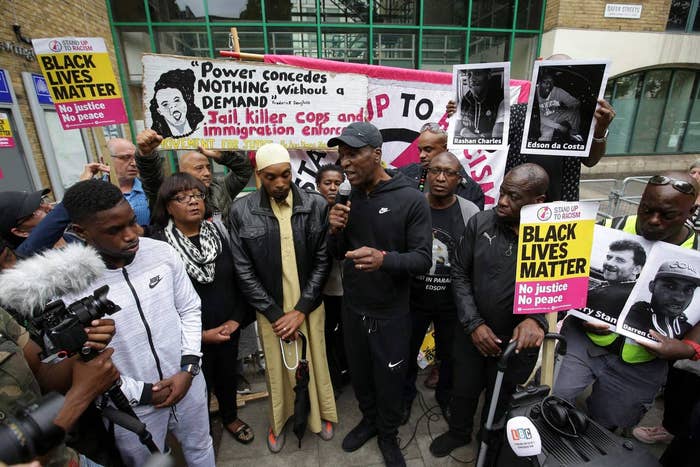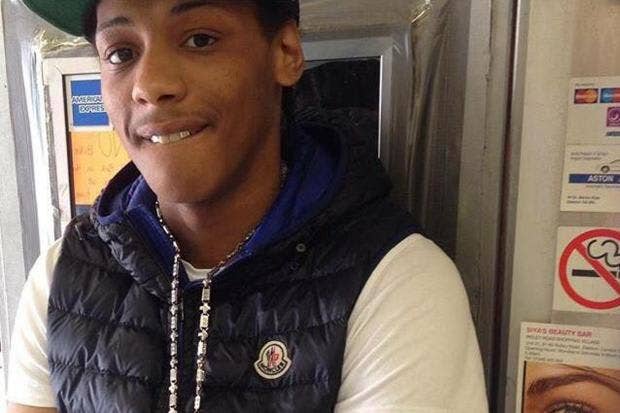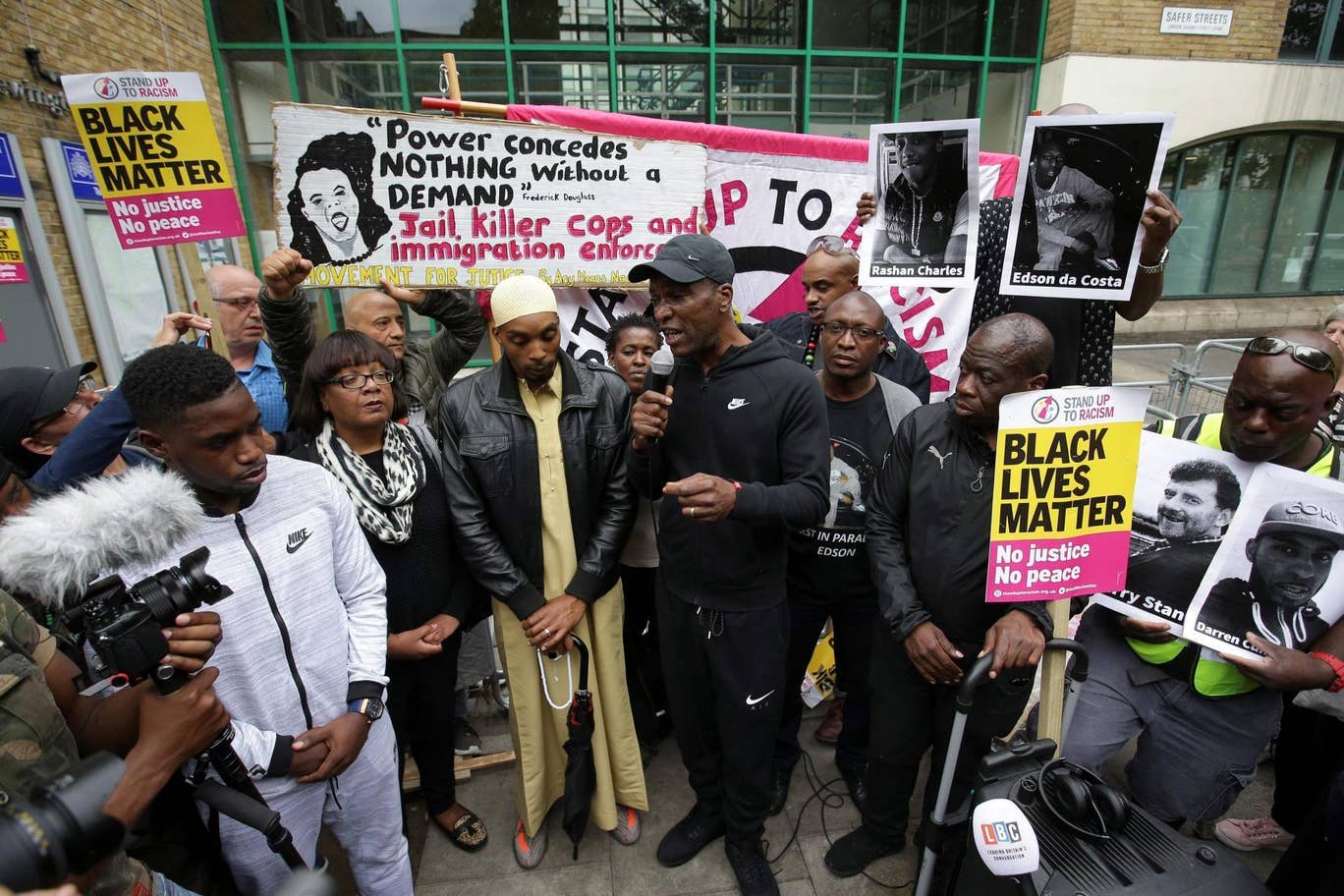
The writer James Baldwin once famously said in The Negro in American Culture, "To be a Negro in this country, and to be relatively conscious, is to be in a rage almost all the time."
In the early hours of Saturday 22nd July, 20-year-old Rashan Charles died at the hands of the police following an arrest attempt on Kingsland Road in Dalston. He was followed into a local shop at 1.45am where he was, according to the Met Police, "trying to swallow an object." CCTV footage of the incident showed the police officer attempting to take Rashan out of the shop before tackling him to the ground, where the struggle took place.
Baldwin's quote often weighs heavy following a grave act of violence upon black people, but with the pervasiveness of social media and how violence becomes a form of spectatorship, sometimes I can't help but feel that the rage is often replaced with hopelessness. Hope, in itself, is dangerous and can often be self-sabotaging. However, even with a notion such as 'hope', it becomes heavily politicised when one considers what it means for black people. It's equally both a tangible and fruitless virtue in the current system and society in which we live.
In an interview with George Yancey of The New York Times, psychologist Shannon Sullivan said, "I admit it's hard to see beyond that dichotomy—hope or despair—and I struggle to see beyond it. But maybe it's a false dichotomy, pegged to hopes that the legal system, including civil rights struggles, can get us out of this mess."
This interview made for harrowing reading due to the fact that despite black hope fundamentally seeking restoration from whiteness, it can also be pretty fruitless. But we need it for survival. The vacuum of time suggests that things over the decades have gotten better following the arrival of black people en masse in the late forties. Linear view towards time and the lens in which young people view history, not only distorts our idea of progress but it corrupts our ideas of hope. Hope is something older generations held onto and passed onto us, believing things had gotten better, and for a brief time many thought so too.

For multiculturalism to truly exist in London, those witnessing protests following Rashan Charles' death ought to understand why they occur.
While hope can bring solace for many, throughout time, history has observed how this is often weaponised against black people, which was made abundantly clear in the borough commander Simon Laurence's statements following Rashan's death. "I would encourage people to keep up-to-date with the IPCC's statements," he said, "as and when they are released." No British officer has ever been convicted following a police brutality misconduct charge and Laurence's statement only further fuels the distant hope that, one day, a PC will be held accountable for their crimes. In May, the officers charged with Alton Sterling's shooting in Louisiana last year were found not guilty following their indictment (nowadays, news of an officer being charged often leads to apathy, because the likelihood of them serving time is always slim).
For me, hope isn't a virtue I hold onto dearly for the sake of my own sanity. English law and America's constitution doesn't consider black people and these acquittals only further validate the cause for uprising. Rioting doesn't bring hope—there's still a lot to be said about whether it can ever solve long-term issues—but it does bring much-needed respite for many. And respite should be a virtue heralded for black people, even if it comes in the form of violence against the very state that enacts it upon us. Rioting exists as an extreme means of civil justice which can often be misconstrued as hate in the minds of white people. Baldwin also once said, "I imagine one of the reasons people cling to their hates so stubbornly is because they sense, once hate is gone, they will be forced to deal with pain." And it's poetic in many ways, because not only have black people already dealt with that pain—which we often do so through acts of rioting—we are still waiting for white people to deal with their own.
The 2011 riots—which came off the back of the police murder of Mark Duggan, an unarmed black man—were the result of a hope that was stolen from black people, and instead of the government seeking to restore such, it responded with criminalisation and misunderstanding that ultimately led to the carving up and 'black upheaval' from areas such as Brixton. Rashan's death doesn't only remind us of the sheer violence that's carried out daily by British police—on any other day he may have survived and the public would be none the wiser—but it also highlights the insidious effects of gentrification. In the last seven years, Dalston and Shoreditch have become hotspots for young revellers in London and habitats for middle-class-out-of-towners looking for a cheap place to live.
The pervasiveness of drug culture in the capital can only suggest that there has been an increase in demand. If Rashan was selling, questions must be asked as to who was purchasing. While his prospective customers were not complicit in his death (accountability shouldn't be removed from the feet of the Metropolitan police), it raises further questions as to whether the multiculturalism London is known for is a fallacy. For multiculturalism to truly exist in London, those witnessing protests following Rashan Charles' death ought to understand why they occur. If hope is absent, black people must be given the space to grieve, vent and hurt, which would at least show some understanding into the disparities between being black and white and living in London.
With yet another case of police brutality to deal with, for many it seems as though there's a sense of hopelessness that has plagued black British people for decades. Hope—I have come to learn—is as fruitless as the entity in which it is placed and the Metropolitan Police nor the Home Office are safe enough for me to place it in.

